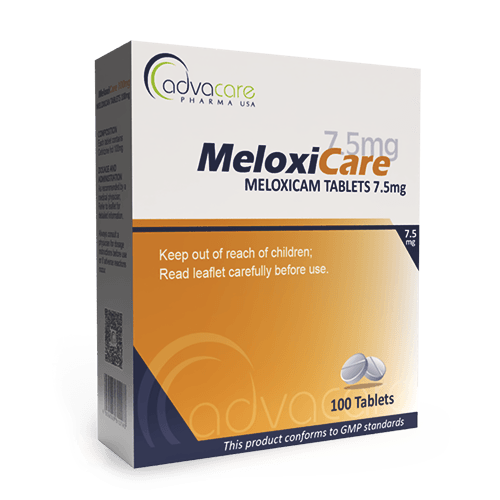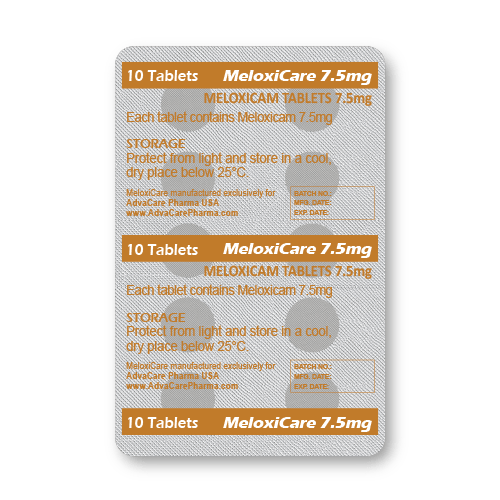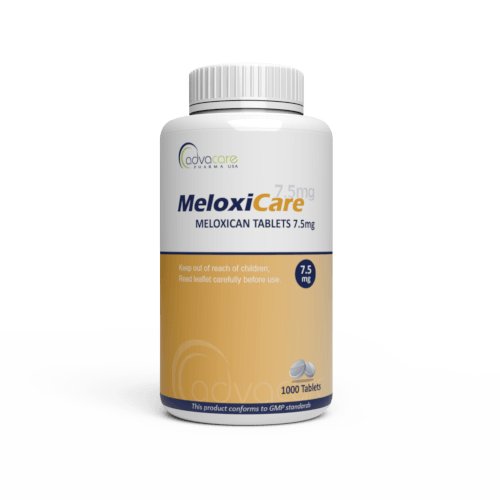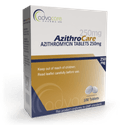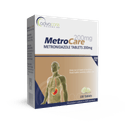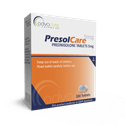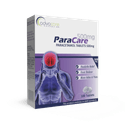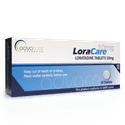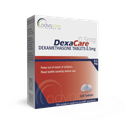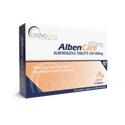- Home›
- Pharmaceuticals›
- Pharmaceutical Tablets›
- Meloxicam Tablets
Meloxicam Tablets
Dosage
Packaging
What is Meloxicam?
Active Ingredients: Meloxicam
Meloxicam Tablets are a non-steroidal anti-inflammatory drug (NSAID) used to relieve symptoms caused by some types of arthritis, such as osteoarthritis or rheumatoid arthritis. This medication is also prescribed to treat symptoms caused by juvenile arthritis in children aged 2 or more years old.
As an NSAID, meloxicam has anti-inflammatory, analgesic, and antipyretic properties. It works by inhibiting cyclooxygenase 1 and 2 (COX-1 and COX-2) from synthesizing prostaglandins, which are molecules that mediate inflammatory responses. Prostaglandins sensitize pain receptors, and their reduced action produces analgesic and anti-inflammatory effects. Meloxicam is a COX-2 selective NSAID, which may reduce its negative gastrointestinal effects.
AdvaCare Pharma is a global supplier of Meloxicam Tablets. AdvaCare excels at the production of high-quality, yet cost-effective, treatments. This medication is manufactured in our GMP-certified facilities located in China, India, and the USA.
Why are we a top Meloxicam manufacturer?
We are a Meloxicam manufacturer engaged in the global distribution of 200+ oral solid pharmaceutical products in tablet dosage form.
As an American-owned and operated company, we are devoted to the manufacture and supply of superior quality, yet cost-effective pharmaceuticals to improve access to healthcare solutions worldwide. AdvaCare Pharma manufactures Meloxicam Tablets, and over 500 other pharmaceutical treatments, according to strict GMP regulations as part of our global commitment to bring efficacious medicines to pharmaceutical distributors, hospitals, pharmacies and other medical institutions.
Uses
What is Meloxicam used for?
Meloxicam is indicated for the relief of pain associated with osteoarthritis or rheumatoid arthritis in adults. It is also used to treat juvenile arthritis involving 2 to 4 joints (pauciarticular) or 5 or more (polyarticular) in children aged 2 years and older.
How should Meloxicam Tablets be used?
This medication is intended to be taken orally. They can be taken with or without food.
What dose should be taken and for how long?
For the management of pain related to osteoarthritis and rheumatoid arthritis in adults, the recommended initial dose is 7.5mg, taken once a day. The maintenance dose may be titrated up to a maximum dose of 15mg, once a day.
For the management of pain related to juvenile rheumatoid arthritis in children (≥ 2 years old) who weigh 60kg or more, the recommended dose is 7.5mg, given once a day. The maximum recommended dose is 7.5mg/day, as additional benefits have not been demonstrated with doses exceeding 7.5mg/day.
Meloxicam Tablets should not be used in children weighing less than 60kg.
The lowest effective dose and the shortest treatment duration possible should be used. The dosage is based on medical condition, response to treatment, age, and weight. Refer to a doctor or pharmacist for guidelines on dosage. Do not exceed what they advise.
What happens if a dose is missed?
Take meloxicam as soon as possible. If it is almost time for the next dose, skip the missed dose. Do not take two doses at once.
Who can use Meloxicam?
Meloxicam can be administered to adults and children (≥ 2 years; ≥ 60kg), but caution is advised for specific groups of patients.
Pregnant Animal studies have shown evidence of embryofetal death with meloxicam administration. NSAID use at 20 weeks gestation or later may cause fetal renal dysfunction or impairment, heart problems, or lower amniotic fluid. NSAID use at 30 weeks gestation or later may cause adverse fetal events, such as premature closure of the fetal ductus arteriosus, oligohydramnios, pulmonary hypertension, platelet dysfunction, and gastrointestinal (GI) or intracranial bleeding.
Meloxicam use past 20 weeks of pregnancy is not recommended. If NSAID use during pregnancy is deemed medically necessary, the lowest effective dose for the shortest duration of treatment should be used, and amniotic fluid should be monitored.
Those who are trying to get pregnant should avoid meloxicam, as it can delay ovulation and impact fertility.
Nursing It is unknown whether meloxicam is excreted in human milk, but it is excreted in animal milk. The effects on nursing infants are unknown. Nursing while taking meloxicam is not recommended and other medications may be preferred. If deemed medically necessary, the potential patient benefits and infant risks should be carefully considered.
Pediatric In pediatric patients < 2 years old, meloxicam use has not been well-studied and has not been approved.
Geriatric Studies have not found evidence that meloxicam affects older adults (≥ 65 years old) differently when compared to younger adults (< 65 years old). Studies have found that older females have increased total serum concentrations and smaller free fractions of meloxicam, but these discrepancies did not produce noticeable differences in therapy responses. Due to the increased risk of drug sensitivity in older adults, dose reduction and organ function monitoring may be considered.
Other warnings
In patients with mild to moderate hepatic insufficiency, dosage adjustments are not necessary. Meloxicam has not been studied in patients with severe hepatic insufficiency, and dosage adjustments may be needed. Cases of severe hepatic reactions, including liver necrosis, jaundice, fulminant hepatitis, and liver failure, some of which have resulted in fatalities, have been reported with NSAID use. Patients with potential signs or symptoms of liver dysfunction or abnormal liver enzyme levels should be evaluated for renal toxicity. Meloxicam should be discontinued if there are signs of liver disease or other systemic symptoms (eosinophilia, rash).
In patients with mild to moderate renal insufficiency, dosage adjustments are not necessary. Meloxicam has not been adequately studied in severe renal insufficiency and is not recommended in such patients. Long-term NSAID use can result in renal papillary necrosis and other renal injury. Patients with renal dysfunction, heart failure, liver dysfunction, those who are taking diuretics and ACE inhibitors, or are older are at an increased risk of renal toxicity resulting from dose-dependent decreases in prostaglandin formation and renal blood flow. These toxic renal effects are usually reversible after NSAID discontinuation.
Clinical studies of various NSAIDs have shown an increased risk of serious cardiovascular (CV) thrombotic events, some of which can be fatal. NSAID treatment groups experience an approximate doubling in heart failure hospitalizations compared to placebo-treated groups. NSAIDs can precipitate new hypertension or worsen pre-existing hypertension, which may increase the risk of adverse CV events. To minimize the potential risk, the lowest effective dose should be used for the shortest duration possible. There is no evidence that concomitant use of aspirin can mitigate these risks and its use with meloxicam increases the risk of adverse gastrointestinal events. Meloxicam should be administered with caution in patients with heart failure, hypertension, or fluid retention.
NSAID use after coronary artery bypass graft is contraindicated due to the increased incidence of myocardial infarctions and strokes with COX-2 selective NSAID, such as meloxicam, use following surgery.
NSAIDs, including meloxicam, can cause serious and potentially life-threatening GI adverse events, including inflammation, bleeding, ulceration, and perforation of the esophagus, stomach, small intestine, or large intestine. Those with a longer duration of NSAID treatment, who are concomitantly using oral corticosteroids, aspirin, or anticoagulants, and who have a history of peptic ulcers, GI bleeding, or bleeding disorder are at a much greater risk for developing these conditions. Smoking, alcohol use, older age, and poor overall health can also increase the risk of GI bleeding. These serious adverse events can occur at any time, with or without warning symptoms, and only 1 in 5 patients are symptomatic. Most cases involve long-term treatment (3 months-1 year), but short-term use is not without risk. Meloxicam treatment should be discontinued immediately if a serious GI event is suspected or confirmed. The lowest effective dose should be used for the shortest duration possible to minimize the risk of adverse GI events. Concomitant use of meloxicam with other prescription or over-the-counter NSAIDs is not recommended due to the increased risk of adverse GI events.
Anaphylactoid reactions that require immediate medical attention have occurred in patients taking meloxicam. Meloxicam should not be administered to patients with aspirin-exacerbated respiratory disease (AERD), asthma, or severe bronchospasms. Like other NSAIDs, meloxicam can cause adverse skin events, such as exfoliative dermatitis, Stevens-Johnson Syndrome (SJS), and toxic epidermal necrolysis (TEN), some of which can be fatal and can occur with or without warning. Meloxicam should be discontinued at the first sign of skin rash or other hypersensitivity reactions.
Side Effects
As with all pharmaceuticals, some unwanted effects can occur from the use of Meloxicam Tablets.
Common side effects include, but may not be limited to:
- diarrhea
- gas
- heartburn
- indigestion
Some serious side effects may include:
- signs of an allergic reaction
- new rash that is not allergy-related
- difficulty breathing
- bloody or tarry stools
- vomiting blood
- jaundice
- unexplained weight gain or bloating
For a comprehensive understanding of all potential side effects, consult a medical professional.
If any symptoms persist or worsen, or you notice any other symptoms, please call your doctor immediately.
Precautions
Do NOT use Meloxicam Tablets if:
- You are allergic to any of the ingredients.
- You have a history of heart-related diseases.
- You have a history of stomach ulcers or bleeding.
- You have fluid retention or kidney disease.
- You have diabetes mellitus or renal impairment.
Due to possible drug interactions, consult with your doctor about any medications you are taking before your treatment.
This medication may not be suitable for people with certain conditions, so it is important to consult with a doctor if you have any health conditions.
Meloxicam 15mg: Why the most common dose?
Meloxicam 15mg is the standard dose for managing pain and inflammation in conditions like arthritis, providing effective relief for severe symptoms. Meloxicam 7.5mg is used for patients requiring a lower dose, initial treatment, or those sensitive to higher doses, allowing tailored pain management.
References
Safety and Efficacy of Meloxicam in the Treatment of Osteoarthritis: A 12-Week, Double-blind, Multiple-Dose, Placebo-Controlled Trial
This is a multicenter study, a double-blind, double-dummy, parallel-group design to investigate the efficacy and safety of meloxicam in 774 patients diagnosed with confirmed osteoarthritis (OA) of the hip or knee experiencing a flare.
Patients were randomized to receive daily oral doses of meloxicam tablets (at 3.75, 7.5, or 15mg/d), diclofenac (100mg [50mg twice daily]), or placebo for a duration of 12 weeks, with regular assessments conducted to evaluate both drug safety and efficacy. Safety assessments included monitoring adverse events, vital signs, and laboratory parameters.
The study revealed a lower incidence of adverse events at each meloxicam dosage compared to diclofenac. Gastrointestinal adverse events and dropout rates due to such events were comparable between meloxicam and placebo, and lower than diclofenac. Meloxicam at 7.5 and 15mg/d, as well as diclofenac, demonstrated statistical efficacy compared to placebo across all endpoints.
The conclusion is that meloxicam is a safe and effective option for the symptomatic management of OA. Meloxicam dosages ranging from 7.5 to 15mg once daily can effectively alleviate OA-related pain and stiffness, with gastrointestinal tolerability comparable to placebo.

You might be interested in...
Why AdvaCare Pharma?
As an industry leader, we are aware of our responsibility to provide affordable and sustainable solutions to improve healthcare worldwide.
